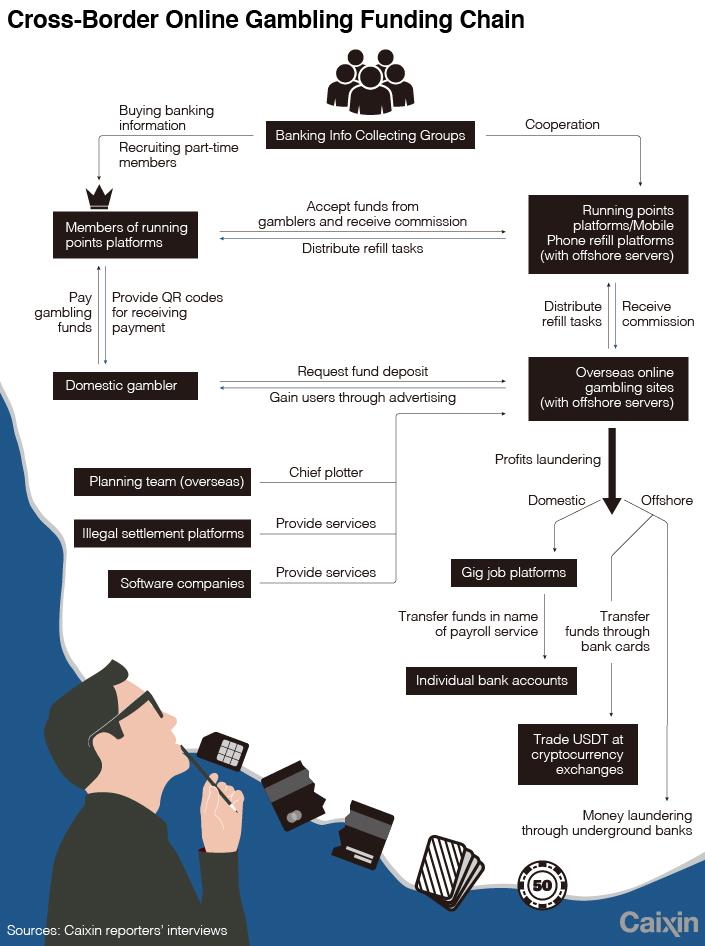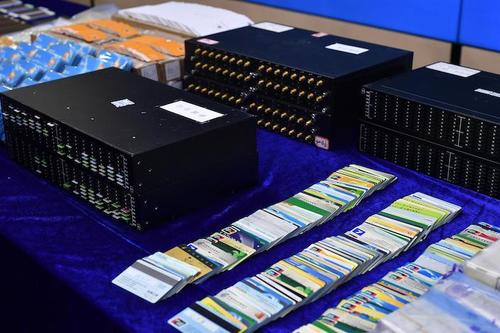
Posted on 12/27/2020 9:37:03 AM PST by SeekAndFind
It has long been known that over the past decade Chinese oligarchs who wanted to bypass Beijing's capital controls and anti-money laundering firewall, would smuggle billions of dollars outside of China by using the Macau casino money-laundering infrastructure, prompting Beijing to crack down aggressively on this popular firewall loophole, with mixed success.
What is less known is that as the capital controls game of cat and mouse escalated in recent years, so have Chinese money laundering tactics and now according to Caixin, Chinese citizens launder as much as $153 billion per year with the help of online gambling and such cryptocurrency as tether, which has long been rumored to be a key driver of upside into bitcoin (the same bitcoin we said in 2015 when it was $250 would soar thanks to Chinese attempts to circumvent the capital firewall... we were right).
Here is the story of how Beijing made this starting discovery, courtesy of Caixin:
A migrant worker from the northern Chinese city Baoding “loaned” three credit cards under his name to friends to offset 2,500 yuan ($380) of debt he owed. He never imagined he would later be arrested for illegal sale of credit cards that were used by criminal groups to launder money for online gambling.
This arrest was part of Chinese authorities’ nationwide “Card Breaking Campaign,” an operation to crack down on illicit bank card transactions and bank card sales to combat telecommunications fraud and cross-border online gambling. The campaign aims to cut off links between mobile phone sim cards and bank cards, and users who are not the registered card holders. Also included are online payment accounts such as Tencent’s WeChat Pay and Alibaba’s Alipay.
This new type of crime has created an illegitimate industry employing 5 million to 6 million people involving information technology (IT), payment settlements and operations, according to an IT department official at the Ministry of Public Security. The complex payments and money laundering system ropes in small individual players in some of China’s remotest places like the migrant worker in Baoding who loan or lease financial credentials to offshore criminal groups, which then help illegal gamblers hide money from authorities, often using Tether.’s USDT cryptocurrency.
In the first nine months of 2020, police cracked down on 1,700 online gambling platforms and 1,400 underground banks involving more than 1 trillion yuan ($153 billion) of illegal transactions, data from the Ministry of Public Security showed. That compared with 7,200 online gambling cases in 2019 totaling 18 billion yuan.
In the cross-border online gambling chain, mobile payments play an increasingly important role. As the front-runner in mobile payments, China has been aggressively promoting payments via mobile phone scans of QR codes, a type of barcode. In China, even a street food vendor owns a unique QR code for receiving mobile payments. The convenience associated with mobile payments has also attracted criminal gambling groups.
As all forms of gambling are illegal under Chinese law, if a Chinese citizen wants to bet using offshore online gambling sites, the first obstacle is depositing money at gambling platforms. These operations often use leading e-commerce platforms and delivery companies to facilitate massive fund transactions disguised as legitimate online shopping deals.
For example, a Caixin reporter tried to deposit 100 yuan via online banking to a gambling site called “DreamGaming.” The transaction showed the money went to an Alipay account linked to a grocery store. That gambling site can no longer be accessed as a notice says “it contains illegal content.”
Online gambling sites usually use so-called “running points platforms” to launder gamblers’ funds to look like legitimate payments. To deposit funds, a gambler follows a payment link on a site that connects to a running points platform. This platform is like a car hailing system. A registered member of the platform will “grab orders” and upload the funds using someone else’s purchased or borrowed bank account. Then the money’s transferred to the offshore gambling site. The platforms make a commission of 2.5% to 4% on the transactions, and the members get a cut of 1% to 2%, according to police.
Chinese social media such as WeChat and Weibo often carry advertisements recruiting part-time workers. Many of these advertisements are posted by running points platforms, which would pay 500–1,000 yuan to each recruited member for their ID numbers, bank cards, mobile phone numbers and bank USB-shield, which is a security tool that looks similar to a flash disk and acts as a shield to protect user’s money in internet banking. If more information can be provided, such as a business license, business seal, business bank account and USB-shield, the price can go up to 1,500–2,000 yuan for the whole set.
To some young jobless people from smaller cities and rural areas, the chance to generate 1,000 yuan from leasing their bank accounts or QR codes is a big temptation, said an insider at a payment process company. And the more transactions go through their accounts, the more they can make in commissions. Of course, they run the risk of arrest for participating in illegal activities. In June, police in southwestern Guangxi province destroyed a cross-border online gambling operation involving 30 billion yuan of fund transfers through running points platforms.
Another channel for depositing money into online gambling sites is through mobile phone credit refills. These transactions are disguised as normal credit additions for mobile phone accounts but actually funnel money into gambling sites.
Bank cards confiscated by Guangdong police in authorities’ “Card Breaking Campaign.”
Cryptocurrency money laundering
After the running points platforms collect money from gamblers, how does the money get to the gambling operators? The traditional path is through underground banks, which facilitate illegal foreign exchange and cross-border trading. These illegal underground banks have long existed in China to help citizens transfer money out of the country to buy property abroad.
A new practice involves Tether (SDT), a cryptocurrency linked to the value of the U.S. dollar. The original goal of the cryptocurrency was to solve the problem of excessive value volatility. In 2019, USDT surpassed Bitcoin as the most-traded cryptocurrency on the market by volume.
USDT is widely used in money laundering, gambling and other illegal activities, an executive at a blockchain platform told Caixin. In October, a local branch of the People’s Bank of China in the southern Chinese city Huizhou conducted mass arrests related to cross-border online gambling, the first crackdown on activities involving USDT. In a blog post, the central bank said 77 suspects were arrested for using USDT in cross-border transactions to launder gambling proceeds worth nearly 120 million yuan.
Most USDT transactions in the Huizhou case were made on Huobi, a Seychelles-based cryptocurrency exchange founded by Tsinghua University graduate and former Oracle engineer Leon Li. Online gambling sites use gamblers’ funds to buy USDT on Huobi and then sell the cryptocurrency, thus “washing” the funds into legitimate cash flow, Huizhou police told Caixin.
China’s public security authorities ordered Huobi and other USDT exchange platforms to strengthen their anti-money laundering efforts by adding video identification verification during transactions to make sure bank cards linked to a trader’s account actually belong to the trader. But the exchanges haven’t done so. An executive at Huobi told Caixin the company completed its biggest upgrade in anti-money laundering risk control in August, without specifying the measures taken.
Huobi’s Li and Bitcoin exchange OKEx founder Xu Mingxing were reportedly cooperating with police on investigations of money laundering for online gambling.
The running points platforms and cryptocurrency exchanges place their servers offshore, increasing the investigative challenge facing police, Huizhou police said.
Difficulty to identify
For online payment platforms such as WeChat Pay and Alipay, the great challenge is to identify which users’ accounts are actually running points platforms. Looking at data of accounts that might be used by running points platforms, the amount of transactions is usually small, and many of them seem to be normal payments for consumption, said Guo Qianting, general manager of Ant Group’s anti-money laundering center. Finding running points platforms among regular users is like looking for a needle in a haystack, she said.
Another money laundering channel is gig job platforms, which provide contractors and payroll services to employers in the food delivery, ride-hailing and e-commerce sectors. More than 10,000 such platforms have emerged in China since 2018. Some of them are service providers for legitimate companies including Meituan Dianping and Didi Chuxing. But many others are used to launder money for online gambling.
In May, a local branch of Agricultural Bank of China in Xiangtan, Hunan province, detected suspicious transactions at a gig job human resources provider. The company had more than 200 million yuan of cash transactions in just a dozen days, and most of the transactions took place during abnormal business hours. Police found that the company laundered money for telecommunications fraud groups.
Last month, another gig job platform backed by Ant Group, China’s dominant online payment service provider, was investigated for suspected money laundering activities. Beijing Bujiao Technology Co. Ltd. was suspected of having falsely issued more than 1.3 billion yuan of value-added tax invoices. Some of the company’s money laundering activities involved cross-border gambling, Caixin learned.
Way back in high school, I worked at a Chinese restaurant and most of the guys in the kitchen were degenerate gamblers, always getting a bet down on something.
Sound like the Mafia has found a new honeypot that works.
Cartels ears perk up.
I think that funding flow chart is fake. Mainly because there is no Biden family member anywhere on it.
sounds like the chinese bad guys have been milking this country for decades and CONgre$$ was willing to turn its little head and just cough.. not to mention the DoJ and the WH .. Trump saw it, has tried to do something about it and this is what ya get.. a boot to the teeth.
Check out the Chinese-themed slot macheeens at your local casinos. That’s all I have to say about that right now.
Don’t use the card.
[sounds like the chinese bad guys have been milking this country for decades and CONgre$$ was willing to turn its little head and just cough.. not to mention the DoJ and the WH .. Trump saw it, has tried to do something about it and this is what ya get.. a boot to the teeth.]
Why are China’s rich moving their money out? Chinese regimes have a history of seizing* the property of its magnates for their own use. Movements of money out of China deprive the regime of the ability to rob them - and it is robbery done at gunpoint - of their property. In addition, the current regime isn’t too happy about the exodus of capital because the sheer volume of such movements could tank the currency, resulting in the kind of hyper-inflation that was a factor in the collapse of the pre-Communist regime.
* It’s not even unique to China. Edward Longshanks of England deported the Jews and seized their property. Philip IV of France did the same and topped Edward by dismantling the Knights Templar, a Christian organization long involved in Crusades for the Holy Land, and seizing their property.
[sounds like the chinese bad guys have been milking this country for decades and CONgre$$ was willing to turn its little head and just cough.. not to mention the DoJ and the WH .. Trump saw it, has tried to do something about it and this is what ya get.. a boot to the teeth.]
This fear isn’t irrational, given that China’s wealthy are now rich beyond the imaginations of their predecessors. Jack Ma (the guy behind China’s Amazon counterpart, Alibaba) alone is worth $57b.
There’s this mistaken perception that China is a mass of obedient drones in thrall to whomever is chief at any given time. This is a clear case of who you’re gonna believe - the narrative or your lyin’ eyes. As pointed out above, over a century before Spartacus, a jumped-up peasant https://en.wikipedia.org/wiki/Emperor_Gaozu_of_Han joined an uprising against the First Emperor https://en.wikipedia.org/wiki/Qin_Shi_Huang, whose idea of collectivism was that everyone should join together to help him unify the known world under his rule.
Were the rebels one big, happy family? No. They slaughtered each other even while fighting the ancien regime and continued this endeavor after the regime was toppled. https://en.wikipedia.org/wiki/Chu%E2%80%93Han_Contention https://en.wikipedia.org/wiki/Han_Xin#Service_during_the_Western_Han_dynasty https://en.wikipedia.org/wiki/Peng_Yue#Death
Was the First Emperor’s ancien regime one big, happy family? No. There were multiple assassination attempts against him. https://en.wikipedia.org/wiki/Qin_Shi_Huang#Third_attempted_assassination He died of poisoning, allegedly while trying out a potion that promised him eternal life. Or was he deliberately poisoned? https://en.wikipedia.org/wiki/Qin_Shi_Huang#Elixir_of_life And after the First Emperor’s death, his closest advisor, the head eunuch, killed *two* of his sons - the putative heir apparent *and* a (puppet) child emperor that this eunuch appointed as a successor to the imperial line. https://en.wikipedia.org/wiki/Zhao_Gao#Coup_following_Qin_Shi_Huang‘s_death Did the regime’s remnants “unify” under this eunuch? No - they fought a knock-down-drag-out war against each other even while fighting the rebels who were out for their heads.
China has always been a seething mass of individual ambition. Elite struggles for power have been part and parcel of historical chronicles outside of China. What’s unique about China, IMHO, is that the ambition goes all the way down to the lowliest peasant. The peasant rebel mentioned above joined a mass revolt, vaulted to the top by (1) playing a secondary role in defeating the ancien regime and (2) wiping out the players who played the primary role, then established a regime that lasted 400 years (with an interruption caused by an ambitious courtier who revolted and set himself up as emperor), thanks to his precaution of either forcibly retiring or killing the military commanders (each of whom had their own agendas, much like term-limited Roman consuls) who had brought him to power.
At the slightest opportunity, charismatic men possessed of organizational skills have repeatedly rallied large numbers to their banners and either established new regimes, or come within striking distance, doing great damage, and paving the way for the next challenger to finish the job. That is why Chinese rulers are never at ease - the principal lesson of Chinese history is that the smallest spark could set off a nationwide conflagration.
It is raw individual ambition, not collectivism, that sets the Chinese experience apart, no matter how much regime propaganda over thousands of years keeps trying to convince the population that they are mere cogs in a machine. Overwhelming regime power convinces the hoi polloi that they should observe the forms of obedience - by not overtly criticizing the regime or opposing it. But in the background, they are bribing officials for relief against tyrannical impositions, evading tax payments and the draft and generally skirting the law to the extent prudent. And when their moment comes - they join general risings and attempt to elevate themselves to the top ahead of everyone else around them.
Disclaimer: Opinions posted on Free Republic are those of the individual posters and do not necessarily represent the opinion of Free Republic or its management. All materials posted herein are protected by copyright law and the exemption for fair use of copyrighted works.